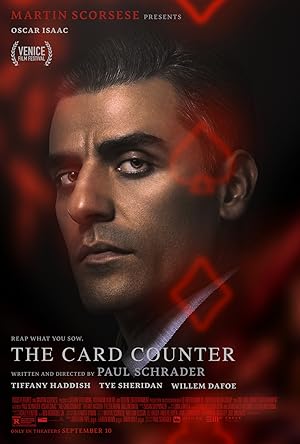The Card Counter
| 2021Directed by: Paul Schrader
Main Plot
The Card Counter follows a former military interrogator named William Tell, who has turned to a life of gambling to escape his troubled past. Living a solitary existence, he travels from casino to casino, honing his skills in card counting while grappling with the psychological scars of his previous life. His routine is disrupted when he meets a young man named Cirk, who seeks revenge against a mutual acquaintance from their past. As William reluctantly becomes a mentor to Cirk, he is forced to confront the moral implications of his choices and the haunting memories that continue to plague him. The film explores themes of guilt, redemption, and the struggle for personal freedom against the backdrop of the high-stakes world of gambling. William's journey becomes a complex interplay of chance and fate as he navigates his relationships and the consequences of his actions.
Characters
- Oscar Isaac plays William Tell, a former military interrogator turned gambler, seeking redemption while mentoring a troubled young man and confronting his dark past.
- Tiffany Haddish plays La Linda, a financial backer who helps the protagonist, William Tell, by connecting him with high-stakes poker games to fund his quest for redemption.
- Tye Sheridan plays Cirk Baufort, a young man seeking revenge for his father's death, who partners with the protagonist to confront their shared past.
Ending Explained
In the ending of The Card Counter, the protagonist, a former military interrogator turned gambler, faces the consequences of his past actions and the choices he has made throughout the film. After a tense buildup involving his relationship with a young man named Cirk, who seeks revenge against a mutual enemy, the protagonist ultimately decides to confront his own demons rather than continue to enable Cirk's destructive path. The climax occurs when the protagonist chooses to turn himself in, symbolizing a significant shift from his previous life of isolation and avoidance. This act of surrender is a form of redemption, as he acknowledges the pain he has caused and the guilt he carries from his past. The film concludes with him accepting the repercussions of his actions, suggesting that true freedom comes from facing one's guilt rather than running from it. The ending connects to the overall narrative by emphasizing themes of accountability, the weight of trauma, and the possibility of redemption. The protagonist's journey reflects a struggle between the allure of gambling and the need for personal integrity, culminating in a poignant resolution that highlights the importance of confronting one's past to find peace.
